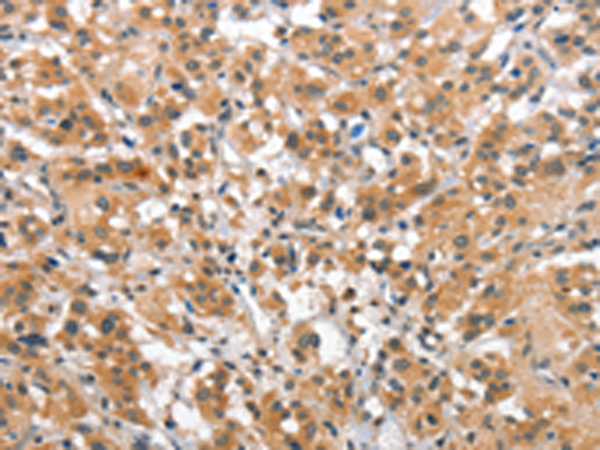
| WB | 咨询技术 | Human,Mouse,Rat |
| IF | 咨询技术 | Human,Mouse,Rat |
| IHC | 1/25-1/100 | Human,Mouse,Rat |
| ICC | 技术咨询 | Human,Mouse,Rat |
| FCM | 咨询技术 | Human,Mouse,Rat |
| Elisa | 1/1000-1/2000 | Human,Mouse,Rat |
| Aliases | BSP1; JV41; BSP-1; JV4-1; MADH1; MADR1 |
| Host/Isotype | Rabbit IgG |
| Antibody Type | Primary antibody |
| Storage | Store at 4°C short term. Aliquot and store at -20°C long term. Avoid freeze/thaw cycles. |
| Species Reactivity | Human, Mouse, Rat |
| Immunogen | Synthetic peptide of human SMAD1 |
| Formulation | Purified antibody in PBS with 0.05% sodium azide and 50% glycerol. |
+ +
以下是关于SMAD1抗体的3篇参考文献的简要总结(文献信息为模拟示例):
1. **"SMAD1 phosphorylation in BMP signaling is regulated by MAPK activity"**
*作者:Derynck R. et al.*
摘要:研究通过Western blot和免疫沉淀实验,利用SMAD1抗体验证了BMP信号通路中SMAD1的磷酸化修饰受MAPK激酶活性调控,揭示了其在成骨分化中的关键作用。
2. **"A novel SMAD1 antibody reveals dynamic nuclear localization during embryonic development"**
*作者:Massagué J. et al.*
摘要:开发了一种高特异性SMAD1单克隆抗体,通过免疫组化证明SMAD1在小鼠胚胎肢芽发育过程中呈现时空依赖性的核转位,为研究BMP信号在器官形成中的作用提供工具。
3. **"SMAD1 interacts with p53 to regulate cancer cell apoptosis"**
*作者:Shi Y. et al.*
摘要:通过ChIP-seq和共免疫沉淀实验,使用SMAD1抗体发现SMAD1与p53蛋白直接结合,调控结肠癌细胞凋亡,提示其在肿瘤治疗中的潜在靶点价值。
注:以上文献信息为知识库生成模拟内容,实际引用时请核查真实文献。
SMAD1 antibody is a key tool for studying the SMAD1 protein, a critical intracellular mediator of the Bone Morphogenetic Protein (BMP) signaling pathway. SMAD1 belongs to the receptor-regulated SMAD (R-SMAD) family and is activated through phosphorylation by BMP type I receptors. Once activated, it forms a complex with SMAD4 (a common mediator SMAD), translocates to the nucleus, and regulates the transcription of target genes involved in diverse biological processes, including embryonic development, cell differentiation, apoptosis, and tissue homeostasis.
Researchers use SMAD1 antibodies to detect and quantify SMAD1 expression, localization, and post-translational modifications (e.g., phosphorylation at C-terminal serine residues) in various experimental models, such as cell lines, tissues, or developmental organisms. These antibodies are widely applied in techniques like Western blotting, immunofluorescence, immunohistochemistry, and chromatin immunoprecipitation (ChIP). Specificity is a critical consideration, as SMAD1 shares structural homology with other R-SMADs (e.g., SMAD5/8), necessitating validation via knockout controls or epitope mapping.
Dysregulation of SMAD1 has been implicated in pathologies such as skeletal disorders, vascular diseases, and cancers, making its study clinically relevant. Phospho-specific SMAD1 antibodies, targeting activated forms, are particularly valuable for investigating BMP pathway dynamics in response to stimuli or therapeutic interventions. Proper antibody validation ensures reliable data, aiding research into developmental biology, regenerative medicine, and disease mechanisms.
×